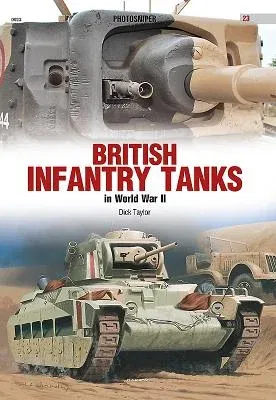Dick Taylor
(Author)British Infantry Tanks in World War IIPaperback, 10 July 2017

Qty
1
Turbo
Ships in 2 - 3 days
In Stock
Free Delivery
Cash on Delivery
15 Days
Free Returns
Secure Checkout

Part of Series
Photosniper
Print Length
96 pages
Language
English
Publisher
Kagero
Date Published
10 Jul 2017
ISBN-10
8365437120
ISBN-13
9788365437129
Description
Product Details
Author:
Book Format:
Paperback
Country of Origin:
PL
Date Published:
10 July 2017
Dimensions:
29.46 x
20.32 x
0.76 cm
ISBN-10:
8365437120
ISBN-13:
9788365437129
Language:
English
Pages:
96
Publisher:
Series:
Weight:
430.91 gm